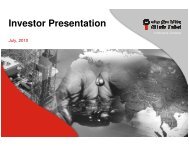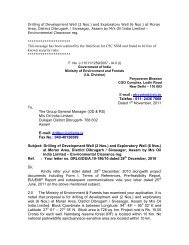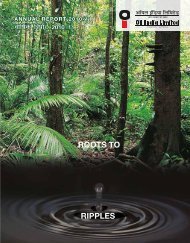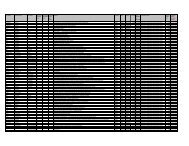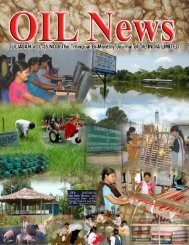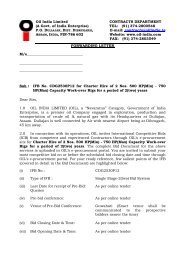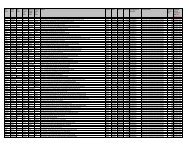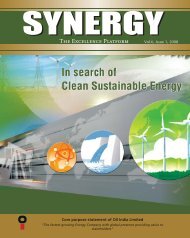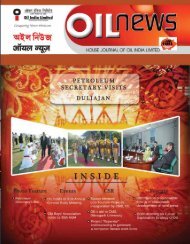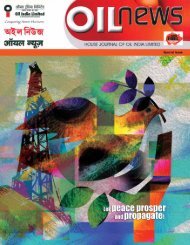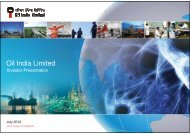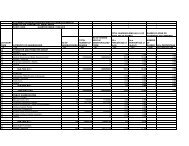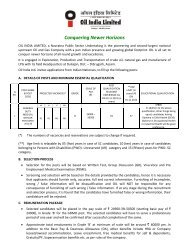Vol. 35 No. 11. Nov - Oil India Limited
Vol. 35 No. 11. Nov - Oil India Limited
Vol. 35 No. 11. Nov - Oil India Limited
You also want an ePaper? Increase the reach of your titles
YUMPU automatically turns print PDFs into web optimized ePapers that Google loves.
Instrumentation experts checking a control panel<br />
"Instrumentation Engineer's area of work can essentially be<br />
summed up as - We sense, measure, record, control and<br />
optimize," said Shri Madhavan.<br />
He informed OIL News that Instrumentation is perhaps the<br />
only department which has maximum executives attached to<br />
different operating departments like LPG, Power House,<br />
SCADA etc. These engineers are responsible for looking after<br />
the day to day instrumentation related services of the concerned<br />
department. However during severe crisis and extremely<br />
complicated situations, they would consult the senior officers<br />
of the parent department.<br />
Instrumentation - its growing presence:<br />
Shri B K Mishra, CE(Inst), elaborating on the Global trend of the<br />
discipline of Instrumentation mentioned that in all major<br />
companies including the state owned GAIL, ONGCL, IOCL etc,<br />
Instrumentation as a Department occupies a very important<br />
position and has a massive set-up. He mentioned that in most<br />
cases, the Instrumentation Department is headed by General<br />
Managers, most of whom went on to become executive directors<br />
of the Company.<br />
Sharing his point of view on the growing relevance of<br />
Instrumentation as a front line technology based discipline,<br />
Shri M S Rao, Dy Chief Engineer said that the level of automation<br />
is going up very fast. Moreover for safety related issues, OISD<br />
insists more automation in field installations. Shri Rao,<br />
highlighting his department's noteworthy contribution in<br />
enhancing value of other departments mentioned about the<br />
contribution of Instrumentation department in enabling<br />
departments like LPG, Chemical Department's Laboratory to<br />
obtain ISO certification. Shri Rao also mentioned that the<br />
Department is introducing latest automation technology in the<br />
new projects like development of non associated gas field, up<br />
gradation of SCADA project in Duliajan and Rajasthan, new<br />
tank farm at OCS 3 (similar to ITF), new OCS at Bhogpara &<br />
Barekuri. Shri Madhavan added that his department is trying to<br />
obtain ISO certification for the department's workshops and<br />
labs. He revealed that the work-persons of the department are<br />
extremely keen on obtaining ISO certification.<br />
Feature<br />
Box*<br />
The Genesis - A brief profile of Instrumentation Department's evolution<br />
- R K Barooah<br />
"If you can measure any thing and express it in numbers, you know something about it, otherwise your knowledge about it is meager."<br />
- Lord Kelvin<br />
During last 50 year development period, Instrumentation has evolved from a series of devices, developed to fill specific needs of<br />
measurement and control, to a science or branch of engineering in itself, where the premises and economics of entire plants and<br />
processes are based on suitable control strategies and instrumentation system.<br />
Till 1983, in <strong>Oil</strong> <strong>India</strong> limited too, Instrumentation had no separate identity or status. Various departments like production, pipeline and plants<br />
like LPG, Power House, and Crude <strong>Oil</strong> Conditioning Plant (COCP) had their individual small instrumentation set-ups which primarily fulfilled<br />
the needs specific to the departments or plants. In field installations like OCS and GCS, Instrumentation consisted of mechanisms, mostly<br />
of mechanical and pneumatic type, devised to fill the specific needs of localized control requirements. Indicators and Recorders revealing<br />
the basic measurements of temperature, pressure, level and flow of the processes were in use in many cases, with the operator<br />
observing measurements and adjusting valves as necessary to achieve desired results. Only few people were working in Instrumentation<br />
& Control theory, as it is defined now. Applications of Instrumentation were founded primarily on experience and not on a strong theoretical<br />
base. It was period of cut-and-try as far as Instrumentation practice is concerned in the company's field operation and hence, its<br />
development was relatively slow until the 1983s.<br />
However in 1983, when 19 nos. Ingersol-Rand (IR) Gas compressors with electronic instrumentation & control panel were installed in<br />
GCSs, a need had arisen for the service of competent instrumentation personnel having professional qualification and experience in this<br />
field. Thus, in order to meet the critical demand, a department, namely 'Instrumentation Department' was formed in <strong>Oil</strong> <strong>India</strong> <strong>Limited</strong> in 1983.<br />
The department started to function with a skeleton of skilled manpower (see box) and limited resources and infrastructure facility. Initially,<br />
the office cum workshop of the department was in two small rooms near the Contracts Department, where the Safety Department was<br />
functioning till the other day. Dr. P Bharali, the then GM (TS) of the Company, took pivotal role in opening the department. . The first ever job<br />
responsibility of the department was installation, commissioning and maintenance of electronic instrumentation & control system of the 19<br />
<strong>No</strong> IR (I) Gas Compressors. Once the above mentioned job responsibility was carried out to the full satisfaction of the Management, more<br />
and more instrumentation jobs of sophisticated nature were entrusted to the department and the department started growing and<br />
developing.<br />
Starting from 1983-84, more and more electronic instruments like transmitter, controller and recorder etc have been used in Company's<br />
operation and processes, which again has hastened the use of computer techniques and adoption of the more advanced control methods<br />
such as adaptive and optimal control. Gradually, new state of the art control systems like DCS, PLC, and Field Bus etc evolved and<br />
improved instrumentation signal transmission systems were introduced in the Company's field operation.<br />
Today, Instrumentation is in a state of flux in OIL. Its status is now such that most of the processes in fields and plants of the company<br />
would not run/operate if they were to be deprived of the services of Instrumentation Department. Presently the plants like LPG, Power<br />
House and process in field like OCS, GCS etc. are being built using 'Best Available Technology' (BAT) in respect of electronic hardware,<br />
computer controls and advanced control concepts, Few examples of technical innovation in the field of Instrumentation, already in use in<br />
the company, are Distributed Control System (DCS) with Advanced Process Control (APC) optimization package in LPG recovery<br />
processes, Programmable Logic Controller (PLC) based panel in GCSs, Power plant etc, Data Acquisition System (DAS) technology in<br />
OCSs to mention a few. A dominant factor in current instrumentation is the impact of microprocessor applications being used to control<br />
directly, to perform economic optimization calculations, to perform conventional monitoring, logging, creation historical/ storage data for MIS<br />
and alarm function essential in today's processes and operation of the Company.<br />
3



